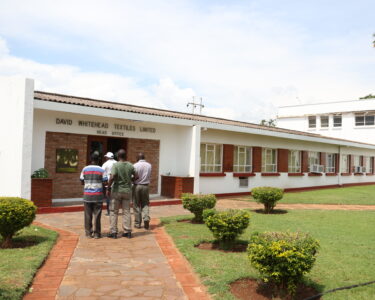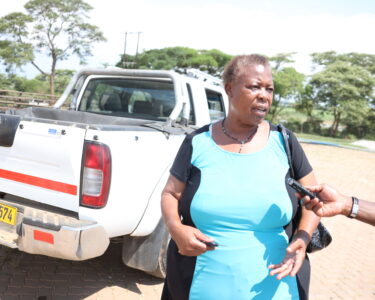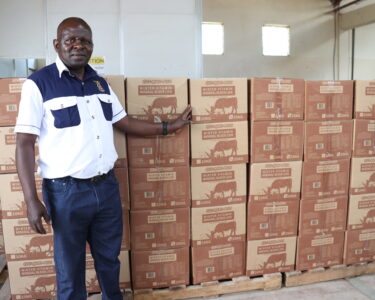At 37 years old, Lincoln Chirinda is one of the youngest successful farmers in Mashonaland West Province. He left his well-paying job in the banking sector soon after his father’s death about five years ago and went into farming full-time at the 550-hectare Fundisai Estates. Farming is not a walk in the park and it is a fact that many children are known to have run down their parents’ businesses soon after inheriting them. But as our Editor-in-Chief Munyaradzi Huni recently found out, it looks like Chirinda is cut out from a different cloth.
Says Chirinda: “I have always had a passion for agriculture. Looking back, I used to enjoy growing maize as a little boy. Whenever it rained, I would rush out and plant some maize seeds and watch them grow. I must say I found it to be quite fascinating. So I can say my love for farming was in-born.
“My mother used to wake us up around 6am when I was around nine years. I would feed our chickens and later on work in the garden. When I was at high school, I took up Fashion and Fabrics but switched to agriculture.
“I did all my secondary education – Forms 1-6 at St Francis of Assisi in Nharira, Chivhu. My dream was to become either a medical doctor or a pilot in line with my father’s wishes. In the end, I ended up studied finance. However, I don’t regret pursuing a career in finance even though I actually studied it by default. “I remember my Dad wanted me to study medicine at a South African university. However, as the enrolment process was very protracted, my father suggested I find something to do meanwhile. This would also give him more time to raise the fees. That’s how I ended up studying finance at Solusi University, Bulawayo. At the end my first year, my father asked me whether I was still keen on going to South Africa. I was. But my Dad hinted that while it was a good idea to purse my medical studies, there would come a time when he might not be in a position to pay the fees.
“That is how I ended up studying finance.” Chirinda did his attachment at African Banking Corporation ( BancABC) from 2006-07, at a time Zimbabwe was going through turbulent times due to the illegal sanctions that had been im[1]posed on the country by the US and its Western allies.
Says Chirinda: “I was fortunate to be attached to the agri-business unit. This was really a tough call in the sense that I was dealing with companies that were not performing well. I was being asked to come up with rescue pack[1]ages for distressed companies in the agricultural sector. I was privileged to visit some of the most productive farms in Zimbabwe. This exposure really opened my eyes.
“In the process, I learnt a lot about farming. I discovered that there is a lot of money in farming and that fixing the companies wasn’t such a big challenge, as long as the farmers had the willpower. “As a black person, I used to ask myself – we had this successful black economic empowerment programme, where exactly are we missing it? As I tried to find answers to these questions, I took notes and learnt quite a lot.”
Chirinda rose through ranks to the position of divisional manager in the business development and corporate banking section. And just as his career was about to take off, disaster struck. Both of Chirinda’s parents passed away in quick succession, his mother in 2015, followed by his father at the end of 2017.
“My parents were beneficiaries of the government’s land reform programme and were into maize, soya beans and wheat farming. When they passed on, I had to quit my banking job after 12 years’ service. I had to make a decision whether to continue with my banking career or to continue the family’s farming legacy. It was a simple de[1]cision for me to make. I was going to be a full-time farmer. I am the eldest in a family of four – two boys and two girls. The girls are married and have their own families, but we work well together.
“When I decided to leave my job, my younger brother was in Canada. He is now back home and I am now taking him through the ropes. When it comes to full-time farming, it’s just the two of us. Our sisters come and go. “Although the farm covers a total of 550 hectares, we are currently working on 350 hectares. The other 200 hectares is rocky and mountainous.” It’s not easy to leave a well-paying white collar job for one in which overalls and gumboots are the order of the day. It’s not easy to leave a well-ventilated office where they serve you free coffee for the rough and tumble of farm life, but for Chirinda there was no going back.
“I was at the crossroads. I was really enjoying interacting with and pro[1]viding solutions to my clients at the bank. On the other hand, some of my colleagues were offering me unsolicited advice, such as: ‘If you can do this for your clients, you can even do better for yourself. It’s high time you left.’ “However, others warned me to tread cautiously as farming was a risky business and I have to emphasise here that farming is tough. But I said to myself: ‘I am still young. Let me try a new chapter. If I leave my full-time job I won’t be the end of the world. If I fail as a farmer I will rejoin the banking sector and continue from where I left off. “But before calling it quits, I sought my pastor’s opinion. His advice was unequivocal: ‘Young man, in life you need to be able to manage your time. If you think it’s high time you left banking, go for it. Don’t hesitate.’ With that in mind and what I had learnt over the years, I said to myself: ‘Other people have done it and I will go for it. If I had the discipline to report for work at 7am and be accountable to my bosses, surely I could do that on my own at this farm’. “I also studied how other wealthy young men had inherited their parents’ businesses and kept them going. There is nothing new under the sun really. I knew I would have to work hard and I was prepared for anything.
“When my parents were allocated this land, I used to spend the bulk of my free time here. As someone who had studied finance, I would help my mother with the bookkeeping and farm accounting. When she passed on, I eventually became an understudy to my Dad, who taught me the nitty-grit[1]ties of farm management. “Now that I am on the ground, I want to be an example of a successful young farmer. I now know that agriculture is the backbone of any economy. As they often say: ‘Three times a day, if not four times a day, everyone of us needs something that comes through the hands of a farmer.’ Be it clothes, be it food, be it where we sleep on and so on. I have always said to myself, ‘I want to be part of something that touches somebody’s life every day’. Agriculture is one sector which connects the farmer to his myriad customers every day.” Chirinda knows that the world is watching and is aware of children who have destroyed their parents’ legacies. But he is confident he won’t be found wanting when push comes to shove.
“It’s a question of mindset. I have read about offspring who inherit their par[1]ents’ businesses and in no time the businesses go belly up. Fortunately, I have mentors who give me advice from time to time. The idea is never to think you know it all. And, above all, don’t be greedy.
“I am doing my best to carry on the legacy and so far so good. It’s all about the vision. The good thing is that we are a united family. Our parents always emphasised the need for unity.” Young brother, Samuel Garikayi, agrees: “We have some challenges, but I am sure we will pull through because, as a family, we are united. We are pulling in one direction. I am still learning but the good thing is that I am finding farming quite fascinating. “I want to carry on with my parents’ legacy. I am the last born but I understand the need to unite with my brothers and sisters. My brother is very tough and I think it’s a good thing if we are to succeed. If he is soft, our parents’ legacy will go down the drain. We won’t allow that to happen.” Chirinda makes no bones about the trials and tribulations of farming: “I have to confess, the first days were not easy and I expected that. I remember approaching a bank for a loan, but I was turned down even though the bank was aware that I was had taken over my father’s farm. They told me: ‘We don’t know you. We knew your father. We want you to show us that you can do this on your own.’ “I had to learn the ropes fast. I also give credit to my former bank col[1]leagues for their unfailing moral and emotional support. I also want to thank the government for supporting me and other famers through Command Agriculture. This has really helped us in terms of financing, especially on inputs. “I also want to thank farming equipment suppliers. They never treated me with kid gloves. I remember one of the suppliers telling me: ‘Young man, we knew your father but we will support you because we believe as a young man you want to make a name for yourself. However, you need to stand on your own. Don’t think you will survive on sympathy.” Indeed, Chirinda is standing on his own like a man. However, just like any farmer, he says he is facing challenges, but is determined to make his parents happy wherever they are. “Farming is a capital-intensive business. You need financiers, especially during the first days. You need longterm capital and you need to be efficient in your farming methods. “I know our agriculture looked like it had gone down in terms of production, but I can assure you that we are now on an unstoppable growth trajectory. Zimbabwe is poised to go far. Mark my words. “Here at Fundisai Estates, we are into maize, soyabeans and wheat farming. We also have over 200 head of cattle, which number is growing. We recently ventured into goat and sheep rearing. Market trends suggest there is going to be a huge demand for goat meat and mutton very soon. “Our average yield for maize last year was around six to seven tonnes per hectare. We faced water challenges, hence the low yield. The nearby dam was drying up and so we could not irrigate most of our land. As a result, we had to rely on the rains. But going forward, we are embarking on conservation agriculture or something akin to Pfumvudza/Intwasa on a commercial scale.” “It is my desire to get to become part of the elite 10-11-tonne per hect[1]are club. I am still learning, but I hope one day to be a member of that club. We are also planning to increase our wheat and soyabean yields. We are already on the ground and I can assure you that this farm will be one of the best in the province,” vows Chirinda, who remains optimistic despite some potential head[1]winds on the horizon. The biggest challenge, says Chirin[1]da, is on the marketing side. “I can see the markets are improving, but we really need to ensure that we get to a food self-reliant level so that we will be able to export our products. Once again, I would like to applaud the government for the unstinting support. I am happy that producer prices of both maize and wheat have been adjusted to allow us to continue farming. We appeal to government to always ensure that producer prices are constantly revised and pay[1]ments to farmers are made timeously. “Irrigation has also been a challenge. We should get to a point where we should depend more on irrigation than on the rains. This will be a game-changer for us. There is also a need to address power loadshedding. However, despite the above-mentioned challenges we are making good progress here.” That noise on social media won’t feed our stomachs Chirinda has a word of advice to Zimbabweans who are in the habit of bad-mouthing their country. “As Zimbabweans, we should move away from this mentality of talking bad about our motherland. In the brick by brick matrix, we are the bricklayers. The bricks have to be laid, stone upon stone, and surely someone has to do it. We have taken the cue from our leaders and agreed that we are the bricklayers. “If we are going to bad-mouth our own country while at the same time ex[1]pecting support from outside, then we don’t know what we are doing. “The more we bad-mouth, the more outsiders shun us. I always say, ‘hapana musha usina rinda (there’s no country without its own unique problems)’. It’s about how you address those challenges. If someone spills a bucket of water on the floor and you stand by without helping mop up, then you are equally to blame. If you step on the water you are likely to slip and injure yourself. How does that help you? The more we make noise on social media, the more it will affect us. That noise won’t put food in our stomachs. We are the masters of our own destiny and we don’t become masters by spending time insulting each other on social media. It’s brick by brick on the ground, not on social media.





